
A point of view shot is a film scene—usually a short one—that is shot as if through the eyes of a character. The camera shows what the subject's eyes would see. It is usually established by being positioned between a shot of a character looking at something, and a shot showing the character's reaction. The POV technique is one of the foundations of film editing.

John Barrymore was an American actor on stage, screen, and radio. A member of the Drew and Barrymore theatrical families, he initially tried to avoid the stage, and briefly attempted a career as an artist, but appeared on stage together with his father Maurice in 1900, and then his sister Ethel the following year. He began his career in 1903 and first gained attention as a stage actor in light comedy, then high drama, culminating in productions of Justice (1916), Richard III (1920), and Hamlet (1922); his portrayal of Hamlet led to him being called the "greatest living American tragedian".

Elaine Stritch was an American actress, known for her work on Broadway and later, television. She made her professional stage debut in 1944 and appeared in numerous stage plays, musicals, feature films and television series. Stritch was inducted into the American Theater Hall of Fame in 1995.

Elaine Barrie was an American actress who appeared in several films and one Broadway play. She was the fourth, and last, wife of actor John Barrymore.

Midnight is a 1939 American screwball comedy film directed by Mitchell Leisen and starring Claudette Colbert, Don Ameche, John Barrymore, Francis Lederer, Mary Astor, and Elaine Barrie.

Trixie Friganza was an American actress. She began her career as an operetta soubrette, working her way from the chorus to starring in musical comedies to having her own feature act on the vaudeville circuit.

Reefer Madness is a 1936 American exploitation film about drugs, revolving around the melodramatic events that ensue when high school students are lured by pushers to try marijuana – upon trying it, they become addicted, eventually leading them to become involved in various crimes such as a hit and run accident, manslaughter, murder, conspiracy to murder and attempted rape. While all this is happening, they suffer hallucinations, descend into insanity, associate with organized crime and commit suicide. The film was directed by Louis J. Gasnier and featured a cast of mainly little-known actors.
Dwain Atkins Esper was an American director and producer of exploitation films.
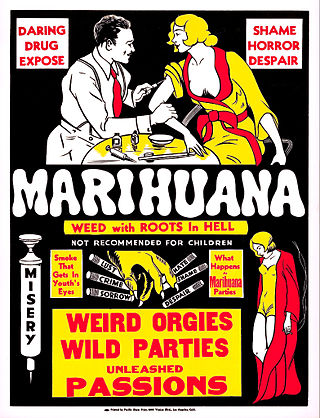
Marihuana is a 1936 exploitation film directed by Dwain Esper, and written by Esper's wife, Hildagarde Stadie.

Beneath the Valley of the Ultra-Vixens is a 1979 satirical sexploitation film directed by American film-maker Russ Meyer and written by Roger Ebert and Meyer. It stars Kitten Natividad and Ann Marie with a cameo by Uschi Digard.

Louis Joseph Gasnier was a French-American film director, producer, screenwriter and stage actor. A cinema pioneer, Gasnier shepherded the early career of comedian Max Linder, co-directed the enormously successful film serial The Perils of Pauline (1914), and capped his output with the notorious low-budget exploitation film Reefer Madness (1936) which was both a critical and box office failure.

Madam Satan or Madame Satan is a 1930 American pre-Code musical comedy film in black and white with Multicolor sequences. It was produced and directed by Cecil B. DeMille and starred Kay Johnson, Reginald Denny, Lillian Roth, and Roland Young.
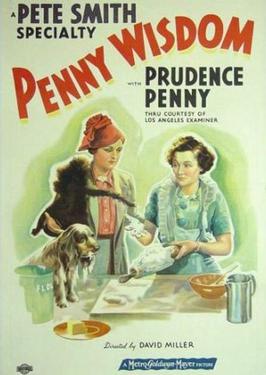
Penny Wisdom is a 1937 American short comedy film directed by David Miller and produced by Pete Smith. In 1938, the film won an Oscar at the 10th Academy Awards for Best Short Subject (Color).
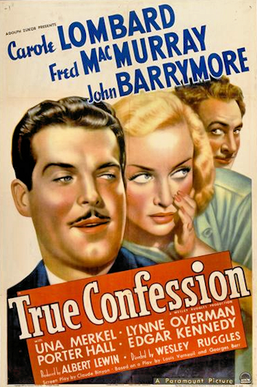
True Confession is a 1937 American screwball comedy film directed by Wesley Ruggles and starring Carole Lombard, Fred MacMurray, and John Barrymore. It was based on the 1934 play Mon Crime, written by Georges Berr and Louis Verneuil. In 1946 it was remade as Cross My Heart.

Grey Gardens is a 2009 American biographical drama television film about the lives of Edith Bouvier "Little Edie" Beale, played by Drew Barrymore, and her mother Edith Ewing "Big Edie" Bouvier, played by Jessica Lange. Co-stars include Jeanne Tripplehorn as Jacqueline Kennedy, Little Edie's cousin, and Ken Howard as Phelan Beale, Little Edie's father. The film, directed by Michael Sucsy and co-written by Sucsy and Patricia Rozema, flashes back and forth between various events and dates ranging from Little Edie as a young débutante in 1936 moving with her mother to their Grey Gardens estate through the filming and premiere of the actual 1975 documentary Grey Gardens.

The Danish Girl is a 2015 biographical romantic drama film directed by Tom Hooper, based on the 2000 novel of the same title by David Ebershoff, and loosely inspired by the lives of Danish painters Lili Elbe and Gerda Wegener. The film stars Eddie Redmayne as Elbe, one of the first known recipients of gender-affirming surgery, Alicia Vikander as Wegener, and Sebastian Koch as Kurt Warnekros, with Ben Whishaw, Amber Heard, and Matthias Schoenaerts in supporting roles.
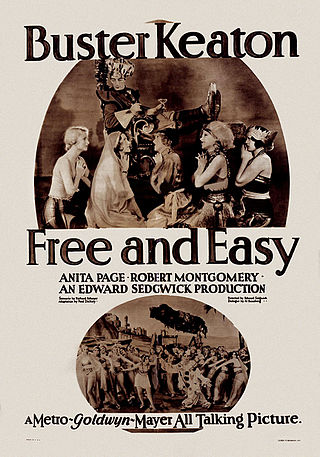
Free and Easy is a 1930 American pre-Code comedy film starring Buster Keaton. It was Keaton's first leading role in a talking motion picture.
I Was A Teenage Feminist is a documentary film directed by Therese Shechter, produced by UpFront Productions and distributed by Women Make Movies. The title is a play on that of the 1957 horror movie, I Was a Teenage Werewolf. The film explores the marked discomfort among many young, progressive women to identify themselves as feminists and how that discomfort came to be. Through personal narrative as well as interviews with feminist icons and everyday women and men, Shechter's film documents a complex, multi-generational look at feminist identity in today's world. The film had its television premiere on March 8, 2005 Canada's W Network, and it won Best Film at the National Council of Jewish Women Film Festival and Special Mention at the Karachi International Film Festival in 2006.
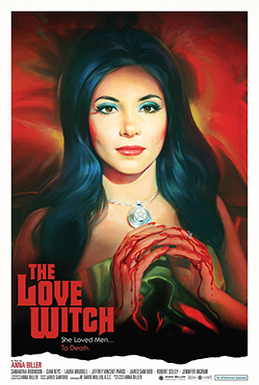
The Love Witch is a 2016 American comedy horror film written, edited, directed, produced, and scored by Anna Biller. The film stars Samantha Robinson as Elaine Parks, a modern-day witch who uses spells and magic to get men to fall in love with her with disastrous results. Shot in Los Angeles and Arcata, California, it premiered at the International Film Festival Rotterdam. In May 2016, it was acquired for distribution at the Cannes Marché du Film by Oscilloscope Laboratories.

The Wages of Sin is a 1938 American drama film directed by Herman Webber and starring Constance Worth, Willy Castello, Clara Kimball Young, and Blanche Mehaffey. It was produced by Willis Kent. Cheaply made, with poor production values, it is an exploitation film made outside the Hollywood production code, dealing with topics of white slavery, prostitution and murder.


















